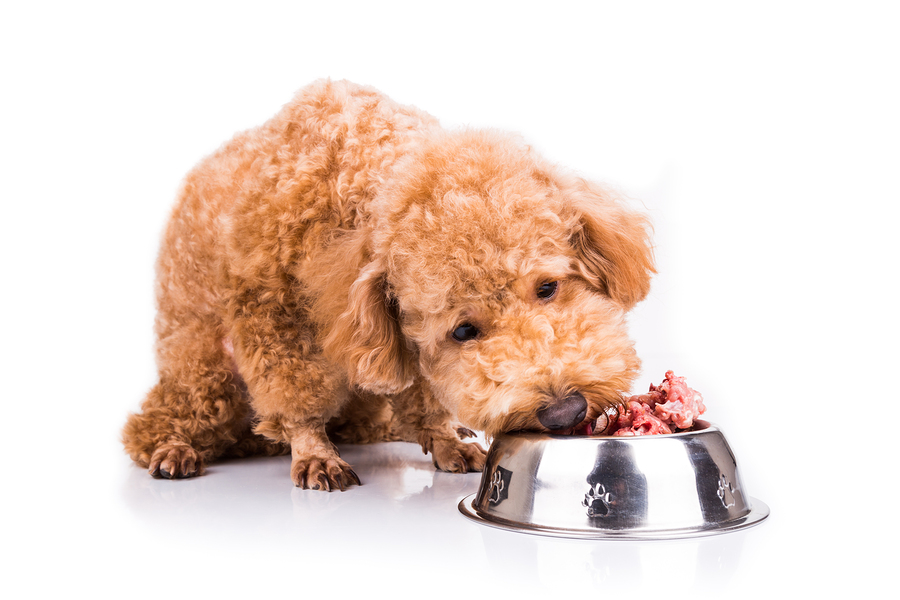
This post may contain affiliate links. We are compensated for referring customers to our affiliate partners.
Of all the diet ideas out there for our pets, the raw dog food diet is one of the more controversial. According to its proponents, food loses important nutrients in the cooking process, and so eating raw food exclusively is better for our health than if we cooked that food first.
However, there are some problems with this approach. For one thing, cooked food is far safer and doesn’t run the risk of E. coli or salmonella. On top of that, the cooking process acts like a kind of pre-digestion, which means cooked food is much easier to digest (and that your digestion destroys nutrients, too). There’s also the fact that, from what archaeologists can tell, humans and human ancestors have been cooking our food for potentially millions of years. As such, our digestive systems are optimized for cooked food.
But with dogs, that’s a different story. Humans only domesticated dogs a few tens of thousands of years ago, and throughout most of that time we didn’t bother to cook most of the food we gave them. As such, dog digestions are still designed for dealing with raw food and the pathogens that sometimes go with it.
While they can certainly digest kibble or heavily processed canned food, raw dog food could potentially make dogs happier and healthier.
However, there are a few important things you should know about before you make the switch.
Dr. Karen Becker Discusses Raw Dog Food
1. Bacteria And Parasites
Even if cooking food didn’t make it easier to digest, it would still be worth it to get rid of all the bacteria, parasites, and other dangerous pathogens that often live in raw meat. Even raw vegetables can be dangerous thanks to the use of manure as fertilizer and the risk of cross-contamination during processing.
Dogs may be more resistant to food poisoning because of their different digestive system, but that doesn’t make them completely immune. Dogs can get inoculations against many of the worst parasites and diseases, but it’s much more important to keep current on them when your dog is eating a raw dog food diet.
At the same time, humans who live with dogs are just as vulnerable to E. coli as ever. This matters because you probably use the same kitchen countertops to prepare raw dog food as you do your own food. Dogs are also very messy eaters, and they can potentially leave scraps of food around your home if you feed them inside.
2. Nutrition Balance
One of the biggest advantages to processed dog food is the fact that you don’t have to spend any time wondering whether your dog is getting the right balance of nutrients. All you have to do is pick out a variety that’s formulated for your pet’s age and size, measure out enough for one or two daily meals, and let your dog do the rest. Government regulators make sure that dog food provides a healthy, balanced diet, so that’s not something you have to worry about.
However, while you can also find prepared raw dog food which also has all the nutrients dogs require, it’s more likely that you’re going to prepare food you buy from the grocery store and your local butcher shop. As such, it becomes your responsibility to create a balanced diet for your dog.
You can find plenty of guides online and in bookstores across the country, so it’s not hard to come up with a good raw food diet for your dog, but you need to remember to plan out a good diet and to remember that dogs are a different species and need a different mix of nutrients and foods than humans. You should also consider using supplements or combining raw and processed dog food just to be on the safe side.
Types Of Meat To Use In A Raw Dog Food Diet
3. Cost
One of the other big advantages of kibble and canned food is the price. The boring brown pellets might not be very exciting, but they are very cheap, and even if you go out of your way to buy the premium stuff, you probably aren’t paying much more than a dollar per day to keep your dog well fed.
However, raw food doesn’t go through a massive rendering process at a big factory. Raw food also doesn’t contain as many cheap grains as kibble does. As a result, whether you buy packaged raw food or put your dog’s diet together yourself, you should expect to pay between two to five times as much on your dog’s food budget, depending on your pet’s size and the price of food in your area.
Raw Dog Food: Getting Started
4. Digestion Problems
Humans can have all sorts of food allergies, incontinence problems, sensitive stomachs, and all kinds of other digestion problems. Dogs are just the same, but with the added wrinkle that they can’t simply tell us what’s wrong with them. Grain allergies in particular are more common in dogs than in humans since they haven’t spent the past few thousand years relying on wheat, rice, and corn to supply most of their daily calories.
It’s because of these problems that many people change their dogs’ diets to see if they do better. As such, your pet may do much better with raw food than with kibble, but don’t forget that your dog is unique. He or she may turn out to do worse instead, so don’t simply assume that raw food is always a better choice.
Raw food may be a better idea for pets than for people, but it comes with pros and cons just the same as any other diet decision. If you decide to feed your dog a raw food diet, you should make sure you understand exactly what it is you’re getting yourself into, first.

